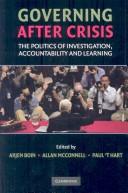| Listing 1 - 10 of 19 | << page >> |
Sort by
|

ISBN: 0521607337 9780521607339 9780521845373 0521845378 9780511490880 0511137222 9780511137228 0511490887 9780511135057 051113505X 1280422181 9781280422188 9786610422180 6610422184 9780421845373 9780531607339 051133138X 9780511331381 1107152070 9781107152076 1107386063 9781107386068 0511183496 9780511183492 0511201443 9780511201448 Year: 2005 Publisher: Cambridge, UK New York Cambridge University Press
Abstract | Keywords | Export | Availability | Bookmark
 Loading...
Loading...Choose an application
- Reference Manager
- EndNote
- RefWorks (Direct export to RefWorks)
Crisis management has become a defining feature of contemporary governance. In times of crisis, communities and members of organizations expect their leaders to minimize the impact of the crisis at hand, while critics and bureaucratic competitors try to seize the moment to blame incumbent rulers and their policies. In this extreme environment, policy makers must somehow establish a sense of normality, and foster collective learning from the crisis experience. In this uniquely comprehensive analysis, the authors examine how leaders deal with the strategic challenges they face, the political risks and opportunities they encounter, the errors they make, the pitfalls they need to avoid, and the paths away from crisis they may pursue. This book is grounded in over a decade of collaborative, cross-national case study research, and offers an invaluable multidisciplinary perspective. This is an original and important contribution from experts in public policy and international security.
Crisis management in government. --- #SBIB:35H201 --- #SBIB:309H271 --- Overheidsmanagement: technieken --- Politieke communicatie: toepassingsgebieden --- Crisis management in government --- Government crisis management --- Public administration --- Gestion des crises --- Gestion des crises. --- Social Sciences --- Political Science --- Kriseledelse --- International sikkerhed --- Politisk ledelse
Book
ISBN: 1626373205 9781626373204 Year: 2022 Publisher: Boulder
Abstract | Keywords | Export | Availability | Bookmark
 Loading...
Loading...Choose an application
- Reference Manager
- EndNote
- RefWorks (Direct export to RefWorks)
Through case studies of two prison systems—the U.S. Federal Bureau of Prisons and the Dutch prison system—Arjen Boin identifies the challenges and opportunities that confront public managers who want to reorient correctional policy and make prisons more effective. Crafting Public Institutions contrasts the two prison systems to show how focused leadership—or its absence—can make a major difference in the character and performance of public organizations. The ability of leaders to shape an organization's mission and motivate public servants in accordance with policy goals, Boin concludes, lies at the heart of making institutions work.
Prison administration --- Institution building --- Social change --- Social institutions --- Social policy --- Administration of prisons --- Prison management --- Prisons --- Management --- Administration
Book
ISBN: 9781107118461 1107118468 9781107544253 1107544254 9781316339756 1316849562 1316339750 1316848728 Year: 2017 Publisher: Cambridge, England : Cambridge University Press,
Abstract | Keywords | Export | Availability | Bookmark
 Loading...
Loading...Choose an application
- Reference Manager
- EndNote
- RefWorks (Direct export to RefWorks)
Crisis management has become a defining feature of contemporary governance. In times of crisis, communities and members of organizations expect their leaders to minimize the impact, while critics and bureaucratic competitors make use of social media to blame incumbent rulers and their policies. In this extreme environment, policymakers must somehow establish a sense of normality, and foster collective learning from the crisis experience. In the new edition of this uniquely comprehensive analysis, the authors examine how strategic leaders deal with the challenges they face, the political risks and opportunities they encounter, the pitfalls they must avoid, and the paths towards reform they may pursue. The book is grounded in decades of collaborative, cross-national and multidisciplinary case study research and has been updated to include new insights and examples from the last decade. This is an original and important contribution from experts in public policy and international security.

ISBN: 1588260097 Year: 2001 Publisher: Boulder Rienner
Abstract | Keywords | Export | Availability | Bookmark
 Loading...
Loading...Choose an application
- Reference Manager
- EndNote
- RefWorks (Direct export to RefWorks)
Digital
ISBN: 9781626373204 Year: 2022 Publisher: Boulder Lynne Rienner Publishers
Abstract | Keywords | Export | Availability | Bookmark
 Loading...
Loading...Choose an application
- Reference Manager
- EndNote
- RefWorks (Direct export to RefWorks)
Book
ISBN: 9014072961 Year: 2000 Publisher: Alphen aan den Rijn Samsom Bedrijfsinformatie
Abstract | Keywords | Export | Availability | Bookmark
 Loading...
Loading...Choose an application
- Reference Manager
- EndNote
- RefWorks (Direct export to RefWorks)
Book
ISBN: 3030517012 3030517004 Year: 2021 Publisher: Springer Nature
Abstract | Keywords | Export | Availability | Bookmark
 Loading...
Loading...Choose an application
- Reference Manager
- EndNote
- RefWorks (Direct export to RefWorks)
This open access book presents case studies of twelve organisations which the public have come to view as institutions. From the BBC to Doctors Without Borders, from the Amsterdam Concertgebouw Orchestra to CERN, this volume examines how some organisations rise to prominence and remain in high public esteem through changing and challenging times. It builds upon the scholarly tradition of institutional scholarship pioneered by Philip Selznick, and highlights common themes in the stories of these highly diverse organizations; demonstrating how leadership, learning, and luck all play a role in becoming and remaining an institution. This case study format makes this volume ideal for classroom use and practitioners alike. In an era where public institutions are increasingly under threat, this volume offers concrete lessons for contemporary organisation leaders. Arjen Boin is Professor of Public Institutions and Governance at the Department of Political Science, Leiden University, Netherlands. Paul ‘t Hart is Professor of Public Administration at the Utrecht School of Governance, Utrecht University, Netherlands. Lauren A. Fahy is a PhD Fellow at the Utrecht School of Governance, Utrecht University, Netherlands.
Public policy. --- Public administration. --- School management and organization. --- School administration. --- Public Policy. --- Public Administration. --- Administration, Organization and Leadership. --- Administration, Educational --- Educational administration --- Inspection of schools --- Operation policies, School --- Policies, School operation --- School administration --- School inspection --- School operation policies --- School organization --- Schools --- Education --- Management --- Organization --- Administration, Public --- Delivery of government services --- Government services, Delivery of --- Public management --- Public sector management --- Political science --- Administrative law --- Decentralization in government --- Local government --- Public officers --- Inspection --- Management and organization --- Public Policy --- Public Administration --- Administration, Organization and Leadership --- Organization and Leadership --- Public Organizations --- Public Value --- Open Access --- Leadership --- Institutional Reform --- International Organizations --- Institutional Adaptation --- Institution-building --- Election Commission of India --- Corrupt Practices Investigations Bureau (CPIB) --- British Broadcasting Corporation (BBC) --- The Riksbank --- The European Court of Justice (ECJ) --- The Amsterdam Concertgebouw Orchestra --- WADA --- The European Organization for Nuclear Research (CERN) --- Rijkswaterstaat --- Médecins Sans Frontières (MSF --- Intergovernmental Panel on Climate Change (IPCC) --- Australian Competition and Consumer Commission (ACCC) --- Educational administration & organization
Book
ISBN: 9781107035799 9781107680289 9781139565400 9781461936695 1461936691 1107274125 9781107274129 1139565400 110768028X 9781107275362 1107275369 1107035791 1107272696 1316090744 1107278619 1107277388 1299772870 Year: 2013 Publisher: Cambridge
Abstract | Keywords | Export | Availability | Bookmark
 Loading...
Loading...Choose an application
- Reference Manager
- EndNote
- RefWorks (Direct export to RefWorks)
The European Union is increasingly being asked to manage crises inside and outside the Union. From terrorist attacks to financial crises, and natural disasters to international conflicts, many crises today generate pressures to collaborate across geographical and functional boundaries. What capacities does the EU have to manage such crises? Why and how have these capacities evolved? How do they work and are they effective? This book offers an holistic perspective on EU crisis management. It defines the crisis concept broadly and examines EU capacities across policy sectors, institutions and agencies. The authors describe the full range of EU crisis management capacities that can be used for internal and external crises. Using an institutionalization perspective, they explain how these different capacities evolved and have become institutionalized. This highly accessible volume illuminates a rarely examined and increasingly important area of European cooperation.
Emergency management --- Crisis management --- Political science --- Government --- General. --- Crises --- Management of crises --- Management --- Problem solving --- Conflict management --- Consequence management (Emergency management) --- Disaster planning --- Disaster preparedness --- Disaster prevention --- Disaster relief --- Disasters --- Emergencies --- Emergency planning --- Emergency preparedness --- Public safety --- First responders --- Planning --- Preparedness --- Prevention --- Social Sciences --- Political Science --- Emergency management - European Union countries --- Crisis management - European Union countries

ISBN: 9780521712446 9780521885294 9780511756122 9780511388392 051138839X 0511387407 9780511387401 0511756127 9780511386398 0511386397 0521885299 0521712440 1107186498 1281255106 9786611255107 0511382731 0511384564 Year: 2008 Publisher: Cambridge Cambridge University Press
Abstract | Keywords | Export | Availability | Bookmark
 Loading...
Loading...Choose an application
- Reference Manager
- EndNote
- RefWorks (Direct export to RefWorks)
The constant threat of crises such as disasters, riots and terrorist attacks poses a frightening challenge to Western societies and governments. While the causes and dynamics of these events have been widely studied, we know little about what happens following their containment and the restoration of stability. This volume explores 'post-crisis politics,' examining how crises give birth to longer term dynamic processes of accountability and learning which are characterised by official investigations, blame games, political manoeuvring, media scrutiny and crisis exploitation. Drawing from a wide range of contemporary crises, including Hurricane Katrina, 9/11, the Madrid train bombings, the Walkerton water contamination, Space Shuttles Challenger and Columbia and the Boxing Day Asian tsunami, this is a ground-breaking volume which addresses the longer term impact of crisis-induced politics. Competing pressures for stability and change mean that policies, institutions and leaders may occasionally be uprooted, but often survive largely intact.
Internal politics --- Crisis management in government. --- Political leadership. --- Leadership --- Government crisis management --- Public administration --- Social Sciences --- Political Science
Book
ISBN: 3030726800 3030726797 Year: 2021 Publisher: Springer Nature
Abstract | Keywords | Export | Availability | Bookmark
 Loading...
Loading...Choose an application
- Reference Manager
- EndNote
- RefWorks (Direct export to RefWorks)
This open access book offers unique insights into how governments and governing systems, particularly in advanced economies, have responded to the immense challenges of managing the coronavirus pandemic and the ensuing disease COVID-19. Written by three eminent scholars in the field of the politics and policy of crisis management, it offers a unique ‘bird’s eye’ view of the immense logistical and political challenges of addressing a worst-case scenario that would prove the ultimate stress test for societies, governments, governing institutions and political leaders. It examines how governments and governing systems have (i) made sense of emerging transboundary threats that have spilled across health, economic, political and social systems (ii) mobilised systems of governance and often fearful and sceptical citizens (iii) crafted narratives amid high uncertainty about the virus and its impact and (iv) are working towards closure and a return to ‘normal’ when things can never quite be the same again. The book also offers the building blocks of pathways to future resilience. Succeeding and failing in all these realms is tied in with governance structures, experts, trust, leadership capabilities and political ideologies. The book appeals to anyone seeking to understand ‘what’s going on?’, but particularly academics and students across multiple disciplines, journalists, public officials, politicians, non-governmental organisations and citizen groups.
Comparative politics --- Public administration --- Comparative Politics --- Public Policy --- Public Administration --- Open Access --- COVID-19 --- coronavirus --- pandemic --- crisis management --- crisis decision-making --- political theory --- crisis politics --- crisis exploitation --- policymaking --- institutional reform --- democratic governance --- transboundary crises --- crisis communication --- crisis narratives --- centralization --- effectiveness --- legitimacy --- leadership credibility --- public trust --- COVID-19 Pandemic, 2020 --- -Crisis management in government. --- Political aspects.
| Listing 1 - 10 of 19 | << page >> |
Sort by
|

 Search
Search Feedback
Feedback About UniCat
About UniCat  Help
Help News
News